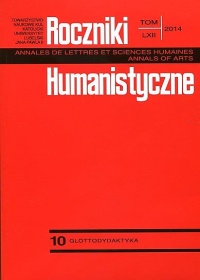Reformulation as a strategy of teaching/learning a foreign language: about the use of it under the conditions of a didactic experiment
Abstract
The article presents the results of a didactic experiment carried out with the same research protocol (reconstructing – orally or in writing – a short narrative text read by the teacher in the subjects’ first/second language) in two groups of learners: adults learning French as a foreign language, and children with hearing problems, rehabilitated towards the development of the phonic Polish, and learning French as a foreign language. The subjects’ task was to reformulate the text they hear so that it would best render the meaning of the source text. Analysis of the collected linguistic data and the conclusion resulting from it show that this type of task is a good way to assess the communicative competence of learners and that reformulating may be considered as a form of communication strategy, through which it is clearly seen if and how learners take the risk connected with performing an actual linguistic task.
References
Cadre Européen Commun de Références pour les Langues. Apprendre. Enseigner. Evaluer. 2001. Conseil de l’Europe. Division des Politiques Linguistiques, Strasbourg. Paris : Didier.
Corder P. 1983. Strategies of communication. In : C. Faerch et G. Kasper (eds), Strategies in Interlanguage Communication. London : Longman, 15-19.
Crystal D. 2006. How Language Works. London : Penguin books.
Cyr P. et Germain C. 1998. Les stratégies d’apprentissage. Paris : Clé International.
Faerch C. et Kasper G. 1983. Plans and strategies in foreign language communication. In: C. Faerch et G. Kasper (eds), Strategies in Interlanguage Communication. London : Longman, 20-60.
Heylighen F. 2008. Five questions on comlexity. In : C. Gershenson (ed.), Complexity: 5 questions. Copenhague: Automatic Press/VIP. Accès en ligne : http://arxiv.org/ftp/nlin/papers/0702/0702016.pdf [Consulté le 30.08.2014].
Kail M. et Fayol M. 2000. L’acquisition du langage. Paris : PUF.
Kail M., Fayol M. et Hickmann M. 2008. Apprentissage des langues. Paris : CNRS Editions.
Karpińska-Szaj K. 2013. Nauczanie języków obcych uczniów z niepełnosprawnością w szkołach ogólnodostępnych. Poznań : Wydawnictwo Naukowe UAM.
Karpińska-Szaj K. et Zajac J. 2012. Les activités métacognitives de l’apprenant en langues étrangères en tant qu’objet de recherche. Défis et problèmes méthodologiques. In : K. Karpińska-Szaj, et J. Zając (réds), Autour de la compétence d’apprentissage de langues : gestion des ressources métacognitives et cognitives. Synergies Pologne, 9. Revue du GERFLINT, 21-35.
Klein W. 1989. L’acquisition de langue étrangère. Paris : Armand Colin.
Kopecka A. 2004. Etude typologique de l’expression de l’espace : localisation et déplacement en français et en polonais. Thèse de doctorat (non publiée). Université Lumière Lyon 2.
Kormos J. 2006. Speech production and second language acquisition. Cognitive sciences and second language acquisition. Mahwah NJ : Lawrence Erlbaum Associates.
Levelt W. 1989. Speaking. From Intention to Articulation. Cambridge MA : The MIT Press.
Little D. 1998. La compétence stratégique examinée par rapport à la maîtrise stratégique du processus d’apprentissage des langues. Le français dans le monde. Recherches et applications. Apprentissage et usage des langues dans le cadre européen, numéro spécial, juillet 1998, 156-167.
Martinot C. 2005. Qu’est-ce-que la ‘Reformulation’ ? Nécessité d’une redéfinition. Roczniki Humanistyczne, LIII (5), 5-13.
Martinot C. 2010. Symposium. Présentation générale. Un phénomène complexe d’acquisition en langue maternelle : le cas des relatives dans une perspective tranlinguistique. In : U. Paprocka-Piotrowska, C. Martinot et S. Gerolimich, La complexité en langue et son
acquisition. Cahier de pré-actes du colloque international. Université Paris Descartes,
-07.07.2010. Paris - Lublin - Udine : Wydawnictwo Werset, 41-44.
Martinot C. 2012. De la reformulation en langue naturelle vers son exploitation pédagogique en langue étrangère : pour un optimisation des stratégies d’apprentissage. In : K. Karpińska-Szaj et J. Zając (réds). Autour de la compétence d’apprentissage de langues : gestion des ressources métacognitives et cognitives. Synergies Pologne, 9. Revue du GERFLINT, 63- 76.
Martinot C.et Ibrahim A. H. 2003. La reformulation: un principe universel d’acquisition. Paris : Editions Kimé.
Martinot, C. et all. 2006. International Project Acquisition & Reformulation. Children of 4 to 10 years old. Unpublished internal project document (December 2006).
Martinot C., Gerolimich S. Bosnjak-Botica T. et Tutunju E. 2012. Un phénomène complexe d’acquisition en langue maternelle: le cas des relatives dans une perspective translinguistique. In : U. Paprocka-Piotrowska, C. Martinot et S. Gerolimich (éds), La complexité en langue et son acquisition. Lublin : Towarzystwo Naukowe KUL, 169-213.
Noyau C., de Lorenzo Ch., Kihlstedt M., Paprocka U., Sanz Espinar G. et Schneider R. 2005. Two dimensions of the representation of complex events structures: granularity and condensation. Toward a typology of textual production in L1 and L2. In : H. Hendriks (ed.), The Structure of Learner Varieties. Berlin : de Gruyter, 157-201.
Paprocka-Piotrowska U. 2009. Conter au risque de tout changer. Complexité conceptuelle et référence aux procès dans l’acquisition du français L2 et du polonais L2. Lublin : Towarzystwo Naukowe KUL et Katolicki Uniwersytet Lubelski Jana Pawła II.
Paprocka-Piotrowska U. 2013. Construction du récit dans la communication en langue étrangère. Lublin : Wydawnictwo Werset.
Paprocka-Piotrowska U., Martinot C. et Gerolimich S. 2012 (éds), La complexité en langue et son acquisition. Lublin : Towarzystwo Naukowe KUL.
Piotrowski S. 2011. Apprentissage d’une langue. Négociations et stratégies en classe de langue étrangère. Lublin : Towarzystwo Naukowe KUL et Katolicki Uniwersytet Lubelski Jana Pawła II.
Tardif J. 1999. Le transfert des apprentissages. Montréal : Les éditions logiques.
Copyright (c) 2014 Roczniki Humanistyczne

This work is licensed under a Creative Commons Attribution-NonCommercial-NoDerivatives 4.0 International License.





